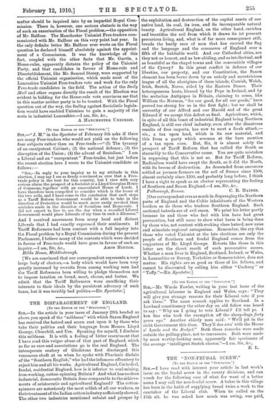pro THE EDITOR OF THE "SPECTATOR. "] Sra,—" J. M." in
the Spectator of February 5th asks if there are many Free-traders who would not yield on the following four subjects rather than on Free-trade :—" (1) The tyranny
of an omnipotent Cabinet; (2) the national defence ; (3) the disruption of the Union ; (4) the advent of Socialism." I am a Liberal and an " unrepentant " Free-trader, but just before the recent election here I wrote to the Unionist candidate as follows :—
" Sta,—In reply to your inquiry as to my attitude in this election, I may say I am as firmly convinced as ever that a Free- trade policy is the best for this country, but I view with very serious alarm the prospect of a Socialist or a Lloyd Georgian House of Commons, together with an emasculated House of Lords. I have therefore been compelled to consider which is the lesser of the two evils, and I have come to the conclusion that such steps as a Tariff Reform Government would be able to take in the direction of Protection would be much more easily revoked than mistakes made in the direction of Socialism and Home-rule. I did not expect to live to see the day when a so-called Liberal Government would place Liberals of my time in such a dilemma."
And I received assurances from many local and distant Liberals that I had exactly expressed their sentiments. If Tariff Reformers had been content with a full inquiry into the Fiscal problem by a Royal Commission during the present Parliament, I believe many of the contests which were decided in favour of Free-trade would have gone in favour of such an
inquiry.—I am, Sir, &c., Antos HINTON. Hilda House, Middlesbrough.
[We ar•e convinced that our correspondent represents a very large body of electors,—a body which would have been very greatly increased by recruits from among working men bad the Tariff Reformers been willing to pledge themselves not to impose taxation on bread, meat, cheese, and butter. We admit that the Tariff Reformers were sacrificing their interests to their ideals by the persistent advocacy of such taxes, but it was terribly bad politics.—En. Spectator.]










































 Previous page
Previous page